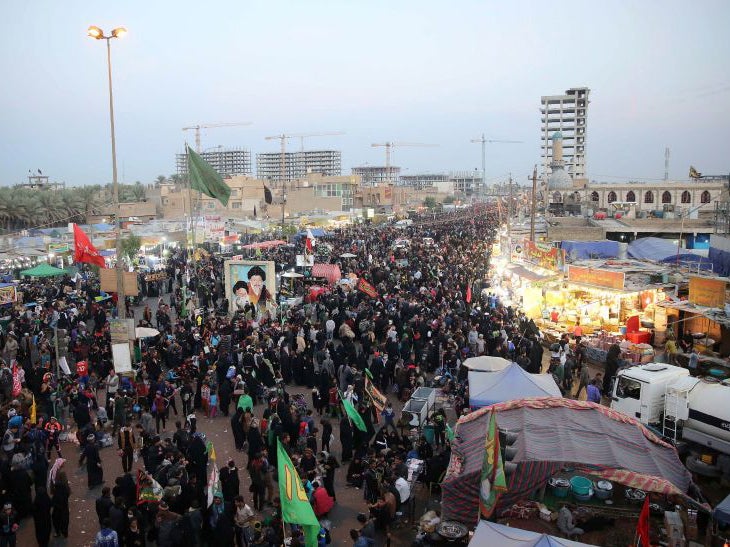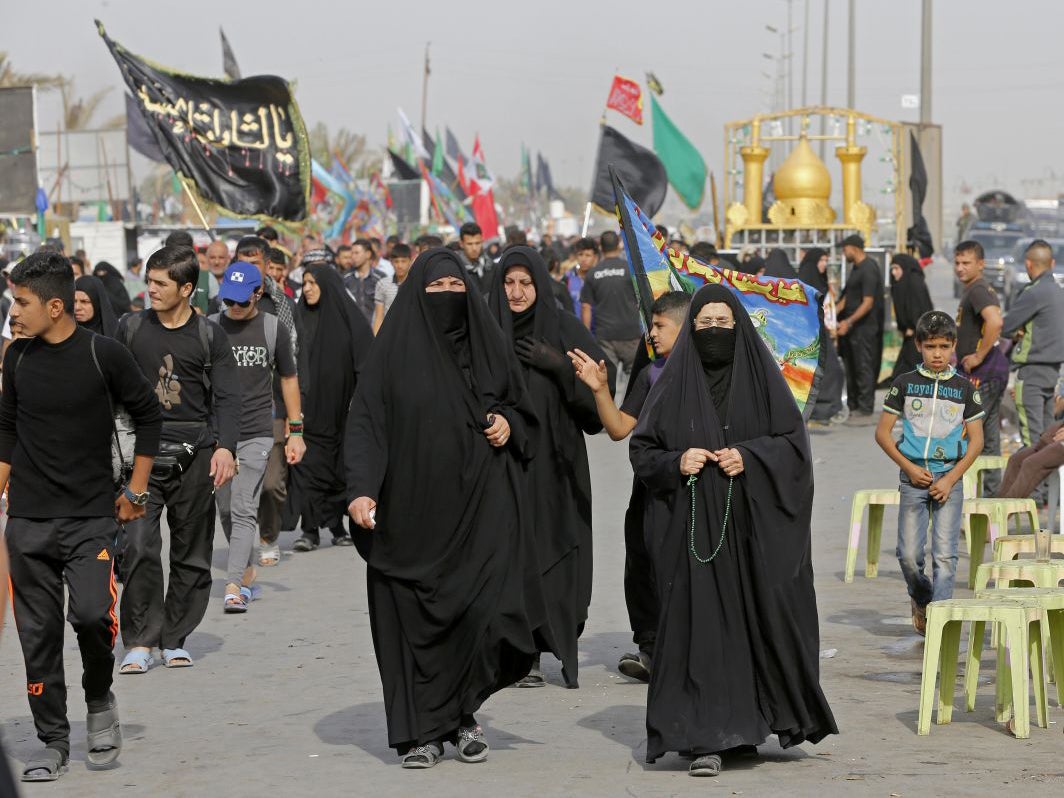Millions of Muslims take part in mass pilgrimage of Arbaeen – in spite of Isis
Isis has attacked the nearby city of Karbala using suicide bombers
Millions of Shia Muslims have taken part in one of the biggest marches in the world, as they travel through Iraq in celebration of a famous Muslim martyr.
The marchers made their way to the city of Karbala, 62 miles south west of Baghdad, on Sunday and Monday for the holy day of Arbaeen, which marks the end of a 40-day mourning period following Ashura, the religious ritual that commemorates the death of the Prophet Mohammad's grandson Imam Hussein in 680 AD.
Large crowds visit the shrines of Imam Hussein and his half-brother Abbas in Karbala, where they were killed in a revolt against the Umayyad ruler Yazeed in the 7th century AD when they refused to pledge allegiance to Yazeed's Umayyad caliphate.
Nusayyef al-Khattabi, who heads the Karbala provincial council, said he expected the total number of visitors over several days to range “between 17 million and 20 million”. Among them are an estimated three million foreigners, the majority Iranians who started crossing the border days ago.
Many choose to make the journey on foot, despite travelling near Isis-controlled areas in the country and the extremist group having made frequent deadly attacks on the pilgrimage.

The march comes as nearly 80 people, many of them pilgrims returning from commemorating Arbaeen in Karbala, were killed in the latest Isis attack in the area.
Isis has declared Shia Muslims apostates and targeted them in its bloody campaign to establish a hardline caliphate across Iraq and Syria.
Large-scale security operations, involving 24,000 soldiers and police, were put in place during this year's march due to fears Isis forces in and around its last major stronghold of Mosul may seek to strike Baghdad or Karbala during Arbaeen.
Karbala, around 50 miles, south west of Baghdad, faces the desert of Anbar, a vast province that was until recently an Isis bastion and where jihadists still carry out frequent attacks.
Last week, a suicide bomber killed six people near Karbala in an attack claimed by the so-called Islamic State.
The pilgrimage has taken on additional meaning in response to this threat, becomimg a protest in recent years against Isis terrorists.
Pilgrim Jaber Kadhem Khalif said: "I came walking from Basra with my wife and three sons... This is the third time. We started walking 13 days ago and reached Karbala on Sunday night."

The 40-year-old said his prayers would go to the Hashed al-Shaabi paramilitary group that has tens of thousands of men deployed on the front lines to fight Isis.
Umm Ali came without her husband, who is with the security forces on the front lines.
“I came with my son and two daughters. I came from Samawa to Najaf by car, then from Najaf to Karbala on foot, to make a plea for my husband's safety.
"We ask God to support us against Daesh [Isis] members, to help us liberate Mosul and urge our politicians to remember the people who have sacrificed so much," the 45-year-old said.
Despite the pilgrimage being one of the world's largest - it is far larger than the Hajj pilgrimage to Mecca in which around 1.5 million people take part - it remains largely unknown in the West.
Organisers of the annual Arbaeen procession in UK have previously spoken of their frustration over the lack of mainstream media coverage of the event.
Mohammed Al-Sharifi, a volunteer at last year's event, previously told the Independent: "I think the reason the mainstream media hasn’t covered the [march] is because I don’t think it's juicy enough to sell papers. It's simply not interesting enough."
"Unfortunately [some] media outlets have gone for stories that to some extent can be divisive. If a group of Muslims do something good, it's not mentioned or the religion is not mentioned. But if someone does something [negative], it is on the front page and their religion is mentioned."
Dr Mohammed Shomali, director of the Islamic Centre of England said: "For Muslims and non-Muslims, the sacrifice and noble message of Imam Hussain represents the peace and virtue of Islam, which prevented Hussain from resorting to violence or capitulation."
“This is why non Muslims as well as Muslims of different sects and denominations have been able to gather together for this event in Iraq and globally - Hussain's decision not to submit to the will of violence is a model all of humanity can replicate."
Additional reporting by agencies
Join our commenting forum
Join thought-provoking conversations, follow other Independent readers and see their replies
Comments